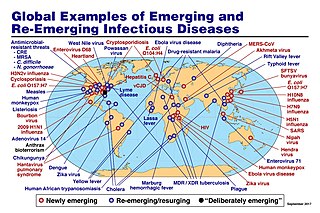
An emerging infectious disease (EID) is an infectious disease whose incidence has increased recently, and could increase in the near future. The minority that are capable of developing efficient transmission between humans can become major public and global concerns as potential causes of epidemics or pandemics. Their many impacts can be economic and societal, as well as clinical. EIDs have been increasing steadily since at least 1940.

Sunetra Gupta is an Indian-born British infectious disease epidemiologist and a professor of theoretical epidemiology at the Department of Zoology, University of Oxford. She has performed research on the transmission dynamics of various infectious diseases, including malaria, influenza and COVID-19, and has received the Scientific Medal of the Zoological Society of London and the Rosalind Franklin Award of the Royal Society. She is a member of the scientific advisory board of Collateral Global, an organisation which examines the global impact of COVID-19 restrictions.

Walter Ian Lipkin is the John Snow Professor of Epidemiology at the Mailman School of Public Health at Columbia University and a professor of Neurology and Pathology at the College of Physicians and Surgeons at Columbia University. He is also director of the Center for Infection and Immunity, an academic laboratory for microbe hunting in acute and chronic diseases. Lipkin is internationally recognized for his work with West Nile virus, SARS and COVID-19.
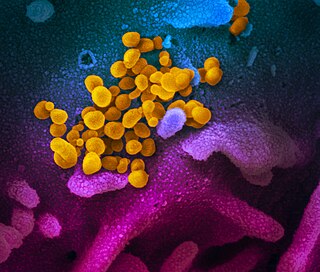
Disease X is a placeholder name that was adopted by the World Health Organization (WHO) in February 2018 on their shortlist of blueprint priority diseases to represent a hypothetical, unknown pathogen that could cause a future epidemic. The WHO adopted the placeholder name to ensure that their planning was sufficiently flexible to adapt to an unknown pathogen. Director of the US National Institute of Allergy and Infectious Diseases Anthony Fauci stated that the concept of Disease X would encourage WHO projects to focus their research efforts on entire classes of viruses, instead of just individual strains, thus improving WHO capability to respond to unforeseen strains. In 2020, experts, including some of the WHO's own expert advisors, speculated that COVID-19, caused by the SARS-CoV-2 virus strain, met the requirements to be the first Disease X.
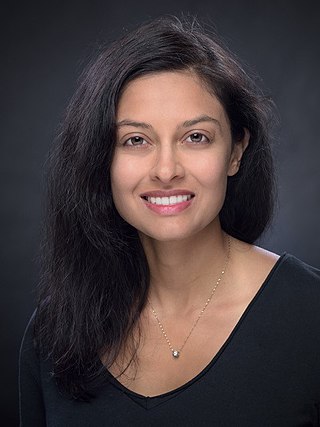
Devi Lalita Sridhar FRSE is an American public health researcher, who is both professor and chair of global public health at the University of Edinburgh, Scotland. Her research considers the effectiveness of public health interventions and how to improve developmental assistance for health. Sridhar directs the University of Edinburgh's Global Health Governance Programme which she established in 2014.

The COVID-19 pandemic, also known as the coronavirus pandemic, is a global pandemic of coronavirus disease 2019 (COVID-19) caused by severe acute respiratory syndrome coronavirus 2 (SARS-CoV-2). The novel virus was first identified in an outbreak in the Chinese city of Wuhan in December 2019. Attempts to contain it there failed, allowing the virus to spread to other areas of Asia and later worldwide in 2020. The World Health Organization (WHO) declared the outbreak a public health emergency of international concern (PHEIC) on 30 January 2020. The WHO ended its PHEIC declaration on 5 May 2023. As of 21 October 2023, the pandemic had caused 771,407,061 cases and 6,972,139 confirmed deaths, ranking it fifth in the deadliest epidemics and pandemics in history.

Severe acute respiratory syndrome coronavirus 2 (SARS‑CoV‑2) is a strain of coronavirus that causes COVID-19, the respiratory illness responsible for the COVID-19 pandemic. The virus previously had the provisional name 2019 novel coronavirus (2019-nCoV), and has also been called human coronavirus 2019. First identified in the city of Wuhan, Hubei, China, the World Health Organization designated the outbreak a public health emergency of international concern from January 30, 2020, to May 5, 2023. SARS‑CoV‑2 is a positive-sense single-stranded RNA virus that is contagious in humans.
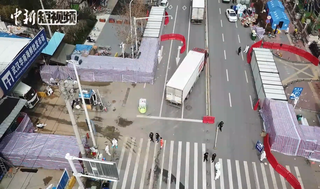
The Wuhan Huanan Seafood Wholesale Market, simply known as the Huanan Seafood Market, was a live animal and seafood market in Jianghan District, Wuhan City, the capital of Hubei Province, in Central China.

The Wuhan Institute of Virology, Chinese Academy of Sciences is a research institute on virology administered by the Chinese Academy of Sciences (CAS), which reports to the State Council of the People's Republic of China. The institute is one of nine independent organisations in the Wuhan Branch of the CAS. Located in Jiangxia District, Wuhan, Hubei, it was founded in 1956 and opened mainland China's first biosafety level 4 (BSL-4) laboratory in 2018. The institute has collaborated with the Galveston National Laboratory in the United States, the Centre International de Recherche en Infectiologie in France, and the National Microbiology Laboratory in Canada. The institute has been an active premier research center for the study of coronaviruses.

Coronavirus disease 2019 (COVID-19) is a contagious disease caused by the virus SARS-CoV-2. The first known case was identified in Wuhan, China, in December 2019. The disease quickly spread worldwide, resulting in the COVID-19 pandemic.

Christian Heinrich Maria Drosten is a German virologist whose research focus is on novel viruses (emergent viruses). During the COVID-19 pandemic, Drosten came to national prominence as an expert on the implications and actions required to combat the illness in Germany.

The World Health Organization (WHO) is a leading organisation involved in the global coordination for mitigating the COVID-19 pandemic within the broader United Nations response to the pandemic.
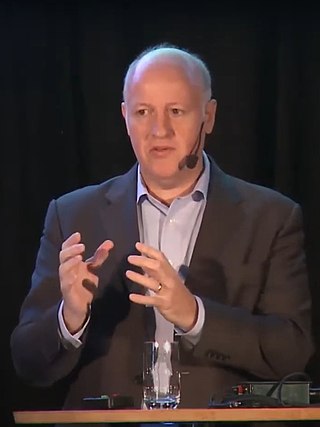
Peter Daszak is a British zoologist, consultant and public expert on disease ecology, in particular on zoonosis. He is the president of EcoHealth Alliance, a nonprofit non-governmental organization that supports various programs on global health and pandemic prevention. He is also a member of the Center for Infection and Immunity at the Columbia University Mailman School of Public Health. He lives in Suffern, New York.

Since the beginning of the COVID-19 pandemic, there have been efforts by scientists, governments, and others to determine the origin of the SARS-CoV-2 virus. Most scientists agree that, as with many other pandemics in human history, the virus is likely derived from a bat-borne virus transmitted to humans via another animal in nature or during wildlife trade such at that in food markets. Many other explanations, including several conspiracy theories, have been proposed. Some scientists and politicians have speculated that SARS-CoV-2 was accidentally released from a laboratory. This theory is not supported by evidence.
The Chinese government has actively engaged in disinformation to downplay the emergence of COVID-19 in China and manipulate information about its spread around the world. The government also detained whistleblowers and journalists claiming they were spreading rumors when they were publicly raising concerns about people being hospitalized for a "mysterious illness" resembling SARS.

The COVID-19 lab leak theory, or lab leak hypothesis, is the idea that SARS-CoV-2, the virus that caused the COVID-19 pandemic, came from a laboratory. The claim is highly controversial; most scientists believe the virus spilled into human populations through natural zoonosis, similar to the SARS-CoV-1 and MERS-CoV outbreaks, and consistent with other pandemics in human history. Available evidence suggests that the SARS-CoV-2 virus was originally harbored by bats, and spread to humans from infected wild animals, functioning as an intermediate host, at the Huanan Seafood Market in Wuhan, Hubei, China, in December 2019. Several candidate animal species have been identified as potential intermediate hosts. There is no evidence SARS-CoV-2 existed in any laboratory prior to the pandemic, or that any suspicious biosecurity incidents happened in any laboratory.
The WHO-convened Global Study of Origins of SARS-CoV-2 or the Joint WHO-China Study was a collaborative study between the World Health Organization and the Government of China on the origins of COVID-19. The study was commissioned by the Director-General of the World Health Organization following a request by the 2020 World Health Assembly in which 122 WHO members proposed a motion, which included a call for a "comprehensive, independent and impartial" study into the COVID-19 pandemic" The WHO disbanded the team and proposed a new panel called Scientific Advisory Group for Origins of Novel Pathogens.
Marietjie Venter is professor in the Department of Medical Virology at the University of Pretoria, where she also heads the Zoonotic Arbo and Respiratory Virus, Centre for Viral Zoonoses. She advises the South African Department of Health and is a chair of World Health Organization's Scientific Advisory Group for Origins of Novel Pathogens.

David Hayman is a New Zealand-based epizootic epidemiologist and disease ecologist whose general multi-disciplinary work focuses on the maintenance of infectious diseases within their hosts and the process of emergence and transmission to humans specifically related to bats. He has gathered data on the relationship between ecological degradation due to anthropogenic actions, and increased pathogen emergence in humans and animals. During COVID-19 he was involved as an expert in several international collaborations, some convened by the World Health Organization, and was a regular commentator in the New Zealand media about the country's response to the pandemic. He has had lead roles in research organisations at Massey University and Te Pūnaha Matatini and was the recipient of the 2017 Rutherford Discovery Fellowship Award. Since 2014 Hayman has been a professor at Massey University.

Liang Wannian is a Chinese epidemiologist, Executive Vice Dean at Tsinghua University's Vanke School of Public Health, and former lead of the Chinese National Health Commission's COVID-19 Response Expert Team.















